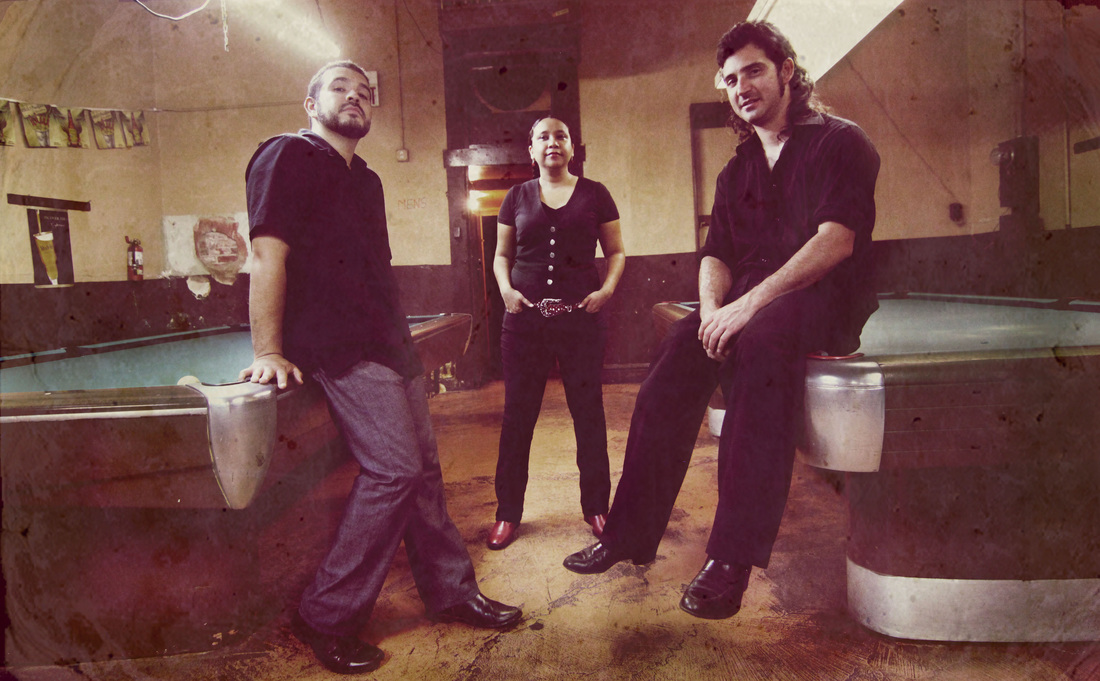Riding high on the Cumbia-resurrection wave is LA-based, Viento Callejero. The band has added its own flavor to those Cumbia classics to which all of us grew up dancing with our abuelas. This urban-flavored twist on old standards has infusions of funk, hip-hop, rock and psychedelia. Their eponymous debut album features a number of guest vocalists, a tradition that also spills over into their live performances.
Forming in 2013, the group has quickly gained recognition and a large following. The band is made up of guitarist Gloria Estrada, formerly of La Santa Cecilia, bassist Federico Zuniga, Jr. of Grammy-nominated band Sistema Bomb, and Chicano Batman drummer Gabriel Villa. Estrada recently took some time to talk to us about the band’s musical and cultural heritage, the current music scene, and the band’s evolution.

You got the band together pretty quick after Santa Cecilia, released a demo, then a full length LP. What’s it like working at such a fast pace?
Viento Callejero is a project that occurred naturally. Federico (bass) has just moved to Los Angeles and reached out to me looking to collaborate. I knew him from his previous cumbia project Cumbia Tokeson and I had been wanting to start a cumbia project for a while so it made sense to make music. It simply lined up.
Talk about how you first became interested in playing guitar?
I learned to play guitar in high school. My counselor said I had room for an elective: home economics or guitar. I opted for guitar and didn’t stop. I always wanted to play an instrument but was too shy to peruse it so took the opportunity when it presented itself.
In an article in OC last summer you said forming another band “almost didn’t happen.” Why?
I was burnt out from playing and touring and I wasn’t sure if I wanted to work in the music industry anymore. I think I just needed a break and a fresh start. My break didn’t last very long because I started getting calls to play and collaborate with folks. The musician in me started getting excited about the musical possibilities and experiments.

Is the melding together of different musical styles in your songs your way of adding to the repertoire of what’s considered the “norm” in terms of Latin music? Are you expanding and pushing limits of the boundaries that categorizing often imposes?
We are an experimental cumbia band that bridges multiple genres and Latin rhythms together. We are following in the musical experimental tip as the bands before us like Los Lobos, Ozomatli, and Quetzal.
What’s like being a female musician and performer in a still mostly male dominated industry?
Being a female Latina in a male dominated industry has had its challenges. I deal with things male musicians never have to deal with but despite the challenges, I haven’t let it stop me. I try to focus on the opportunities that do come my way.
What social issues is the band [collectively] passionate about? Why?
Political and social issues affect us all and we have our personal views on them but as a band we are able to come together and help bring awareness to issues. Although we are not a political band, we do participate and play at events to help community organizations shed light to issues and bring people together.
Why do you collaborate with so many guest vocalists?
We felt that inviting guest vocalists was a way to keep the music fresh and an opportunity to collaborate with folks we wanted to work with. It’s been a fun learning experience to work with so much talent.

What’s the general feel like where you live among musicians. Is it very cut-throat and competitive, or is there more a system of support, collaboration, and friendship?
We feel we are reconnecting and creating a musical family. The fact that we collaborate with so many guest singers has created a camaraderie in the Latin indie music scene. We are in no way the first or only ones doing this but we have created a spark in bringing that back. The cumbia scene in LA is very supportive. We put on shows together and help connect each other to venues/promoters in other cities.
The three of you are either trained and/or experienced, accomplished musicians. When did the spark to pursue music as a lifestyle and career begin for each of you?
Gloria: I decided to pursue a career in music after completing my general education in college. I was reluctant to major in music but all the signs pointed towards it. I couldn’t see myself doing anything else so I took a leap of faith.
Gabriel: I always wanted to be a full time musician but only this year I was able to make it happen. A combination of life events and opportunities I got with my bandmates Chicano Batman and Viento Callejero made it possible to take that step.
Federico: I always wanted to be a full time musician but at first I did not have the courage to do so. But after continuing to be called out to tour, write music, and work with VC I made the jump and have not looked back since.
Are you working on new material for another album? If so, when’s the release date?
Yes! We are excited to release a 45 vinyl of a new song called “El Remolino” in the fall through Soul Fiesta Records. The artwork was designed by Ernesto Yerena. The song was a written in collaboration with singer Tony Sauza of the group Cuicani and was produced by Eugene Toale. We have also been writing a lot of new material and hoping to record later this year.
soundcloud.com/vientocallejero
Photo: Piero F. Giunti/Melissa I. Avilez

